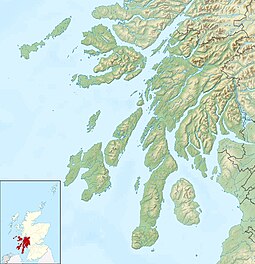Luing
| Gaelic name | Luinn |
|---|---|
| Meaning of name | pre-Gaelic name of unclear meaning |
 View from near Toberonochy, Luing |
|
| Location | |
|
Luing shown within Argyll and Bute
|
|
| OS grid reference | NM740100 |
| Coordinates | 56°14′N 5°39′W / 56.23°N 5.65°W |
| Physical geography | |
| Island group | Slate Islands |
| Area | 1,430 hectares (5.5 sq mi) |
| Area rank | 40 |
| Highest elevation | 94 metres (308 ft) Beinn Furachail |
| Administration | |
| Sovereign state | United Kingdom |
| Country | Scotland |
| Council area | Argyll and Bute |
| Demographics | |
| Population | 195 |
| Population rank | 32= |
| Pop. density | 12.6 people/km2 |
| Largest settlement | Cullipool/Culapul |
| References | |
Luing (Gaelic: Luinn) is one of the Slate Islands, Firth of Lorn, in the west of Argyll in Scotland, about 16 miles (26 km) south of Oban. The island has an area of 1,430 hectares (5.5 sq mi) and is bounded by several small skerries and islets. It has a population of around 200 people, mostly living in Cullipool, Toberonochy (Tobar Dhonnchaidh), and Blackmillbay.
A regular ferry service crosses the 200 metres (660 ft) wide Cuan Sound which separates Luing from the neighbouring island of Seil, which is in turn connected by bridge to the mainland.
The main industries on Luing are tourism, lobster fishing and beef farming, although slate quarrying was important until 1965, with quarries at Toberonochy, Cullipool, and a smaller one at Port Mary. Slate from Luing was used in the construction of the University of Glasgow and re-roofing of Iona Abbey.
For such a small island, Luing has produced numerous mod gold medallists: Nan MacInnes (1926, in Oban), Sandy Brown (1938, in Glasgow) and Hughie MacQueen (1985, in Lochaber).
Luing cattle were first developed here, as a commercial beef breed hardy enough to prosper under adverse weather. They are a breed of red beef cattle, produced by the Cadzow family in 1947 from a cross between Beef Shorthorn and Highland cattle.
According to Haswell-Smith (2004) the name "Luing" may derive from the Old Norse lyng, meaning "heather" or long meaning ship. However, Mac an Tàilleir (2003) states "this is probably a pre-Gaelic name of unclear meaning."
...
Wikipedia

